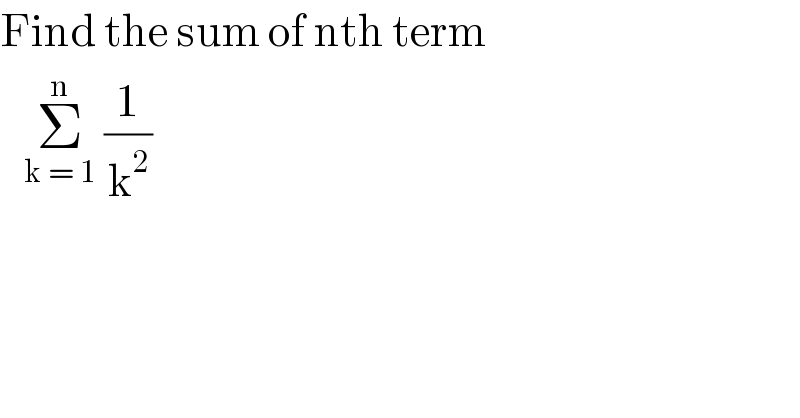
Question Number 78162 by TawaTawa last updated on 14/Jan/20

$$\mathrm{Find}\:\mathrm{the}\:\mathrm{sum}\:\mathrm{of}\:\mathrm{nth}\:\mathrm{term} \\ $$$$\:\:\:\underset{\mathrm{k}\:=\:\mathrm{1}} {\overset{\mathrm{n}} {\sum}}\:\frac{\mathrm{1}}{\mathrm{k}^{\mathrm{2}} } \\ $$
Commented by msup trace by abdo last updated on 15/Jan/20

$${if}\:{you}\:{have}\:{the}\:{answer}\:{post}\:{it}... \\ $$
Commented by TawaTawa last updated on 15/Jan/20

$$\mathrm{I}\:\mathrm{don}'\mathrm{t}\:\mathrm{know}\:\mathrm{the}\:\mathrm{answer}\:\mathrm{or}\:\mathrm{how}\:\mathrm{to}\:\mathrm{solve}. \\ $$
Commented by mathmax by abdo last updated on 15/Jan/20
![this sum can be reduced by this manner by iam waiting for a miraculous method..! let ξ_n (2)=Σ_(k=1) ^n (1/k^2 ) ⇒ ξ_n (2) =Σ_(p=1) ^([(n/2)]) (1/((2p)^2 )) +Σ_(p=0) ^([((n−1)/2)]) (1/((2p+1)^2 )) =(1/4) ξ_([(n/2)]) (2)+Σ_(p=0) ^([((n−1)/2)]) (1/((2p+1)^2 )) and ξ_([(n/2)]) (2) =Σ_(k=1) ^([(n/2)]) (1/k^2 ) =Σ_(p=1) ^([(1/2)[(n/2)]]) (1/((2p)^2 )) +Σ_(p=0) ^([(([(n/2)]−1)/2)]) (1/((2p+1)^2 )) =ξ_([(([(n/2)])/2)]) (2) +Σ_(p=0) ^([(([(n/2)]−1)/2)]) (1/((2p+1)^2 )) and we remplace in ξ_n (2) also we can use the decomposition ξ_n (2) =Σ_(p=1) ^([(n/3)]) (1/((3p)^2 )) + Σ_(p=0) ^([((n−1)/3)]) (1/((3p+1)^2 )) +Σ_(p=0) ^([((n−2)/3)]) (1/((3p+2)^2 )) =....](Q78250.png)
$${this}\:{sum}\:{can}\:{be}\:{reduced}\:{by}\:{this}\:{manner}\:{by}\:{iam}\:{waiting}\:{for} \\ $$$${a}\:{miraculous}\:{method}..!\:\:\:{let}\:\xi_{{n}} \left(\mathrm{2}\right)=\sum_{{k}=\mathrm{1}} ^{{n}} \:\frac{\mathrm{1}}{{k}^{\mathrm{2}} }\:\Rightarrow \\ $$$$\xi_{{n}} \left(\mathrm{2}\right)\:=\sum_{{p}=\mathrm{1}} ^{\left[\frac{{n}}{\mathrm{2}}\right]} \:\:\frac{\mathrm{1}}{\left(\mathrm{2}{p}\right)^{\mathrm{2}} }\:+\sum_{{p}=\mathrm{0}} ^{\left[\frac{{n}−\mathrm{1}}{\mathrm{2}}\right]} \:\frac{\mathrm{1}}{\left(\mathrm{2}{p}+\mathrm{1}\right)^{\mathrm{2}} } \\ $$$$=\frac{\mathrm{1}}{\mathrm{4}}\:\xi_{\left[\frac{{n}}{\mathrm{2}}\right]} \:\left(\mathrm{2}\right)+\sum_{{p}=\mathrm{0}} ^{\left[\frac{{n}−\mathrm{1}}{\mathrm{2}}\right]} \:\frac{\mathrm{1}}{\left(\mathrm{2}{p}+\mathrm{1}\right)^{\mathrm{2}} }\:\:{and} \\ $$$$\xi_{\left[\frac{{n}}{\mathrm{2}}\right]} \left(\mathrm{2}\right)\:=\sum_{{k}=\mathrm{1}} ^{\left[\frac{{n}}{\mathrm{2}}\right]} \:\frac{\mathrm{1}}{{k}^{\mathrm{2}} }\:=\sum_{{p}=\mathrm{1}} ^{\left[\frac{\mathrm{1}}{\mathrm{2}}\left[\frac{{n}}{\mathrm{2}}\right]\right]} \frac{\mathrm{1}}{\left(\mathrm{2}{p}\right)^{\mathrm{2}} }\:+\sum_{{p}=\mathrm{0}} ^{\left[\frac{\left[\frac{{n}}{\mathrm{2}}\right]−\mathrm{1}}{\mathrm{2}}\right]} \frac{\mathrm{1}}{\left(\mathrm{2}{p}+\mathrm{1}\right)^{\mathrm{2}} } \\ $$$$=\xi_{\left[\frac{\left[\frac{{n}}{\mathrm{2}}\right]}{\mathrm{2}}\right]} \left(\mathrm{2}\right)\:+\sum_{{p}=\mathrm{0}} ^{\left[\frac{\left[\frac{{n}}{\mathrm{2}}\right]−\mathrm{1}}{\mathrm{2}}\right]} \:\frac{\mathrm{1}}{\left(\mathrm{2}{p}+\mathrm{1}\right)^{\mathrm{2}} }\:{and}\:{we}\:{remplace}\:{in}\:\xi_{{n}} \left(\mathrm{2}\right) \\ $$$${also}\:{we}\:{can}\:{use}\:{the}\:{decomposition}\: \\ $$$$\xi_{{n}} \left(\mathrm{2}\right)\:=\sum_{{p}=\mathrm{1}} ^{\left[\frac{{n}}{\mathrm{3}}\right]} \:\frac{\mathrm{1}}{\left(\mathrm{3}{p}\right)^{\mathrm{2}} }\:+\:\sum_{{p}=\mathrm{0}} ^{\left[\frac{{n}−\mathrm{1}}{\mathrm{3}}\right]} \:\frac{\mathrm{1}}{\left(\mathrm{3}{p}+\mathrm{1}\right)^{\mathrm{2}} }\:+\sum_{{p}=\mathrm{0}} ^{\left[\frac{{n}−\mathrm{2}}{\mathrm{3}}\right]} \:\frac{\mathrm{1}}{\left(\mathrm{3}{p}+\mathrm{2}\right)^{\mathrm{2}} } \\ $$$$=.... \\ $$
Commented by TawaTawa last updated on 15/Jan/20

$$\mathrm{God}\:\mathrm{bless}\:\mathrm{you}\:\mathrm{sir} \\ $$
